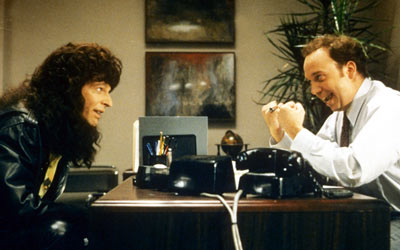Controversy follows some people around like the plague, mainly because they seem to invite it.
Talk radio hosts in particular seem to open the door wide regardless of their political leanings. Guys like Rush Limbaugh and Don Imus have made massive names for themselves with incendiary words and sometimes bizarre actions that take it one step over an ever moving line. But there is one name that not only crosses the line on a daily basis, he vaults over it.
One of the most inflammatory radio personalities in the history of radio is undoubtedly Howard Stern. His radio antics have become legendary, garnering the stations he worked for a cumulative amount of $2.5 million in FCC fines between 1990 and 2004. Most of those fines fall under the category of indecency.
In 1993, Stern released a book called Private Parts. It did double duty as an autobiography covering his early years in radio that took him to the top and a memoir of what kept him there. Given that Private Parts was one of his publisher’s biggest selling books, it was no surprise that a movie followed. Stern was involved heavily in its development and was quite picky about the script, leading to its release in theatres several years later in 1997. That pickiness paid off big as Private Parts was both a critical and commercial success.
The film shows us Stern’s development from a young boy through college and his earliest days in radio, as fraught with failure as they were. It took Stern a long time to find real success, eventually making his way to the top of the pile in New York City. The film leaves off in 1985 shortly after he takes the top spot away from the reigning champ, Don Imus at WNBC. The film also details how Stern came to work with key collaborators like Robin Quivers and Fred Norris who played themselves in the film. Stern himself is even the lead actor, playing himself throughout most of it. You have to engage your “suspension of disbelief” function thoroughly to accept the adult Stern as a college freshman but the movie would have been nowhere near as good without him. Private Parts also holds the distinction of being the film that launched the career of actor Paul Giamatti, who played a version of Stern’s WNBC handler.
Keeping in mind that this is a comedic interpretation of actual events, Private Parts is both entertaining and engaging though you can’t always be sure how accurate it is. Stern becomes a sympathetic figure, driven to succeed on his terms. It’s hard to watch this movie and not root for that success, despite his predilection to offend to entertain.
To call Stern a polarizing figure is an understatement. Segments like Bestiality Dial-a-date earned him a well-deserved reputation for being the man to take it way too far, yet also charming enough to get away with it.
To an extent.
A few months after the end of the events covered by the movie, WNBC tossed Stern and friends out the door. He went on to greater success at other stations and took his show into syndication across the US. In 2006, Stern made the jump to satellite radio where he is free from FCC rules. While he has drawn huge numbers of subscribers, it is arguable that his sphere of influence has decreased as he now broadcasts only to those who have Sirius. But that sphere of fans can now follow him anywhere.
[related_content slugs=”navigating-netflix-happy-endings,navigating-netflix-doctor-who,navigating-netflix-semi-pro,navigating-netflix-conan-the-barbarian” description=”More Navigating Netflix” position=”right”]
Private Parts leaves off at a high point in Stern’s career. In the years and months after that, he went through significant changes in his career that warrant a follow up in another film. But until then, it’s fun to go back and take look at one of the most divisive figures in modern American pop culture.
–
Ian Goodwillie is a columnist for the Spectator Tribune. Follow him on Twitter at @ThePrairieGeek and on Tumblr at iangoodwillie.tumblr.com.
